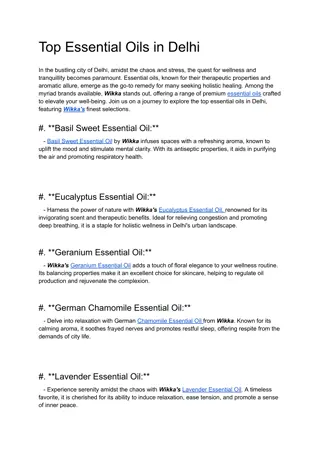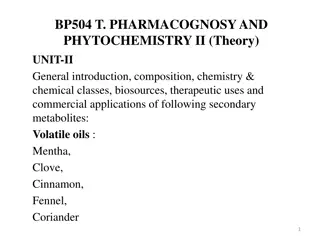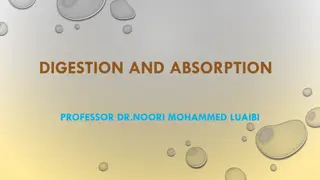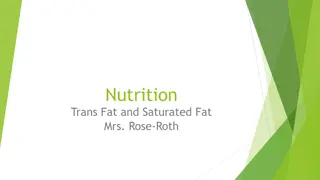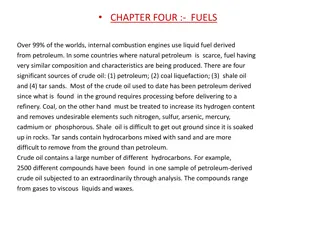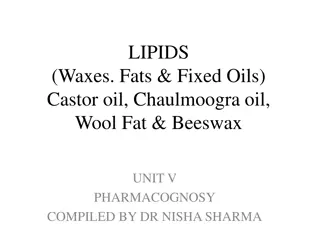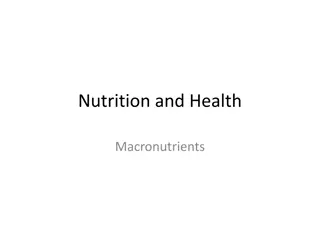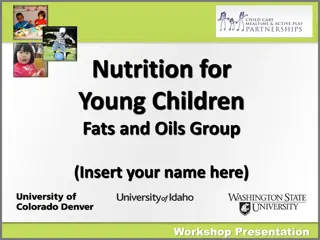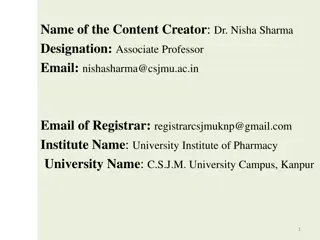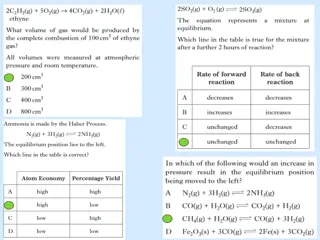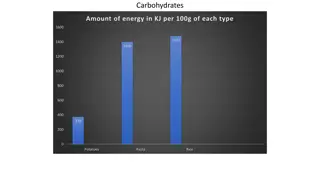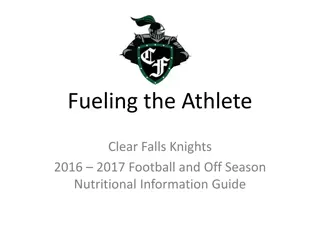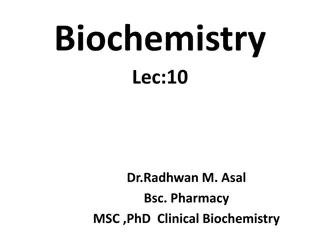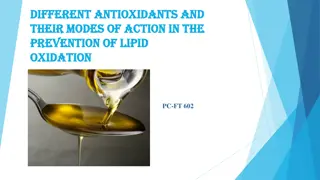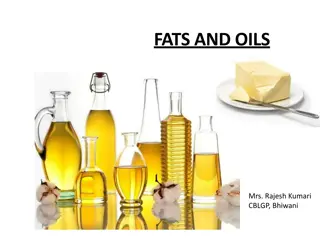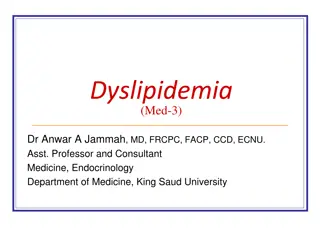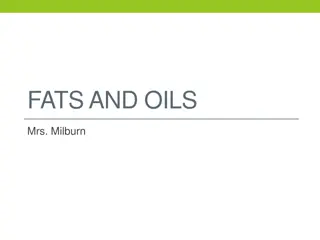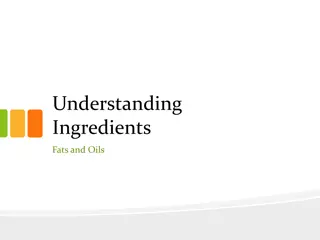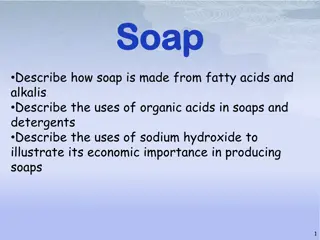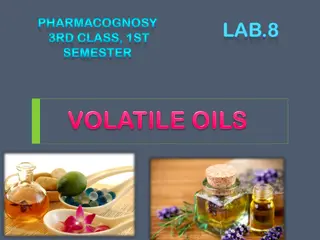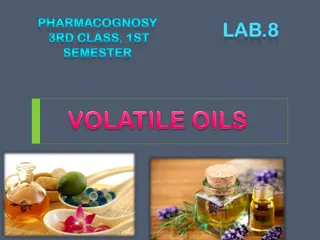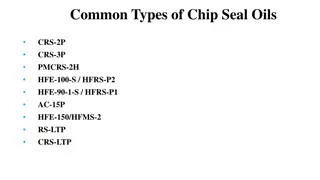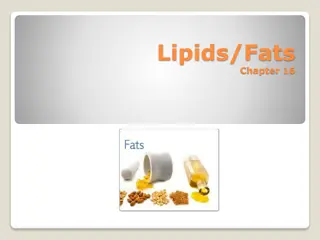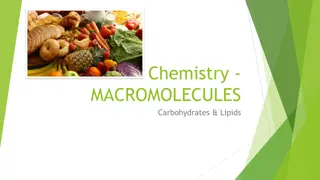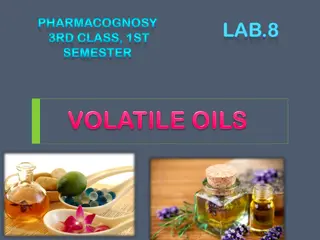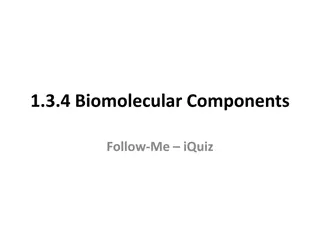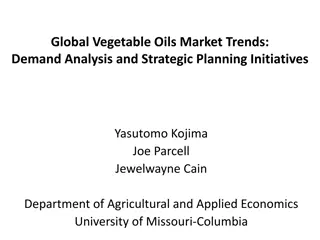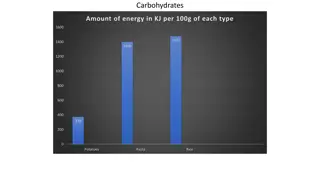Top Essential Oils in Delhi
In the bustling city of Delhi, amidst the chaos and stress, the quest for wellness and tranquillity becomes paramount. Essential oils, known for their therapeutic properties and aromatic allure, emerge as the go-to remedy for many seeking holistic healing. Among the myriad brands available, Wikka st
2 views • 3 slides
Get the Top-Quality Essential Oils in Australia in Wholesale
Explore the premium selection of wholesale essential oils in Australia Pastel Pines offers. \n\nOur diverse range of essential oils is expertly crafted to enhance your well-being and elevate the ambience of any space. \n\nAs a family-owned Australian business, we take pride in providing high-quality
0 views • 5 slides
Volatile Oils in Pharmacognosy and Phytochemistry: Composition, Chemistry, Uses
Volatile oils, also known as essential oils, are derived from terpenes and their oxygenated compounds. These oils possess characteristic odors and are extracted from plants through various methods like hydro-distillation and steam distillation. They are commonly used as flavoring agents, perfumes, a
0 views • 29 slides
Understanding Digestion and Absorption in the Gastrointestinal Tract
Digestion and absorption in the gastrointestinal tract are crucial processes for breaking down carbohydrates, fats, and proteins into smaller compounds that can be absorbed by the body. Carbohydrates undergo hydrolysis to convert into monosaccharides, fats are broken down from triglycerides, and pro
1 views • 22 slides
Understanding Trans Fat and Saturated Fat in Nutrition
Trans fats are unsaturated fats that can have negative health effects, found in baked goods, fried foods, and more. Saturated fats, mostly found in animal products, may increase the risk of heart disease. Learn how trans fats affect health and which foods contain them.
0 views • 11 slides
Understanding Fuels and Their Sources
Fuels derived from petroleum, coal, shale oil, and tar sands are crucial for powering internal combustion engines. Crude oil contains various hydrocarbons requiring refining processes to obtain products like natural gas, gasoline, kerosene, diesel oils, fuel oils, and lubricating oils. The chemical
1 views • 7 slides
The Digestive Journey: From Skittles in the Mouth to Nutrient Absorption in the Intestine
The process begins with chewing skittles in the mouth, where salivary amylase breaks down sugar. The bolus then travels down the esophagus via peristalsis into the stomach, further broken down by gastric juice. The pancreas releases enzymes like amylase and lipase to digest sugars and fats. Bile pro
1 views • 15 slides
Understanding Lipids: Waxes, Fats, and Fixed Oils
Lipids are organic compounds like waxes, fats, and fixed oils found in plants and animals. Fixed oils are reserve food materials, while fats are solid at higher temperatures. These substances are esters of glycerol and fatty acids, with various components giving them unique properties and flavors. C
0 views • 20 slides
Introduction to Lipid Biosynthesis and Fixed Oils in Pharmacognosy Lecture
In this lecture by Asst. Prof. Dr. Ibrahim Salih, the focus is on lipid biosynthesis, specifically the three phases involved: glycerol formation, fatty acid biosynthesis, and triglyceride production. The classification of fixed oils into drying, semi-drying, and non-drying categories based on their
0 views • 13 slides
Growth in Cross-Border Electricity Trade Sparks Increased Transformer Oil Use
Transformer Oil Market by Type (Naphthenic Oils, Silicon-based Oils, Bio-based Oils, and Paraffinic Oil, and Others), By Function, By End-Use, By Application, By Region and Companies - Industry Segment Outlook, Market Assessment, Competition Scenario
0 views • 4 slides
Preparation Methods and Uses of Aromatic Water in Pharmacy
Aromatic water is a liquid pharmaceutical preparation containing volatile oils or essential oils. It is used as a pleasant medium for administering water-soluble drugs. Various preparation methods include distillation, solution, alternate solution, and dilution methods. Distillation method is used f
2 views • 17 slides
Get High Quality Essential Oils Online in Australia
Essential oils are well-known for their therapeutic properties and can be used in diffusers for aromatherapy. Pastel Pines, specialising in home fragrance and decor products, that includes essential oils online in Australia.\n\nOur wide range of esse
2 views • 4 slides
Understanding Essential Oils: Properties, Chemistry, and Uses
Explore the fascinating world of essential oils, from their properties and uses to the chemistry behind their distinctive aromas. Learn about terpenes, key components in essential oils, and discover their modern applications in cosmetics, cleaning, flavors, and more. Understand what essential oils a
0 views • 36 slides
Comprehensive List of Essential Oils and Their Benefits
Explore a diverse collection of essential oils ranging from Clove to Ylang Ylang, each offering unique properties and benefits. From common oils like Peppermint to exotic choices like Devdhar, this list covers a wide range of aromatic essences used for various purposes such as aromatherapy, skincare
0 views • 5 slides
Comprehensive Automotive Lubricant Function and Properties Training
Explore the essential aspects of lubricants in automotive systems, covering functions like friction reduction, heat transfer, and contamination containment. Learn about base oils, additives, and formulating lubricants using mineral oils, synthetic oils, and vegetable oils, with advantages and disadv
2 views • 50 slides
Understanding Macronutrients: Carbohydrates, Sugar, Proteins, Fats
Explore the essential macronutrients including carbohydrates, sugar, proteins, and fats. Learn about their functions, types, food sources, and impact on health. Understand the role of sugar in energy provision and potential health risks. Discover the importance of starch as a common carbohydrate in
0 views • 59 slides
Understanding the Importance of Fats and Oils in Young Children's Nutrition
This workshop presentation provides trainers with detailed information on the fats and oils group, emphasizing the key nutrients, benefits to the body, recommended intake, and types of fats. It educates on the necessity of fat in children's diets, highlighting how fats contribute to overall well-bei
1 views • 17 slides
Essential Insights on Volatile Oils and Their Properties in Pharmacognosy
Explore the fascinating world of volatile oils in pharmacognosy with Dr. Nisha Sharma, an Associate Professor at C.S.J.M. University. Learn about the physical and chemical properties of volatile oils, their classification based on functional groups, and examples of different types of volatile oils u
0 views • 12 slides
Understanding Fats and Oils: Properties and Formation
Learn about the properties of fats and oils, including their formation through a condensation reaction of glycerol with fatty acids. Explore the role of fats in the diet, different types of natural fats and oils, and the chemical composition of triglycerides. Discover the significance of fatty acids
0 views • 17 slides
Nutritional Comparison of Carbohydrates, Proteins, Fats, and Vegetables
This infographic presents the energy content in kilojoules (KJ) per 100g of different food types, including carbohydrates (potatoes, pasta, rice), proteins (shrimp, lamb, bacon), fats (olive oil, avocado, peanut butter), and vegetables (broccoli, red peppers, carrot). The data depicts the varying en
0 views • 5 slides
Essential Nutrition Guide for Athletes: Fueling the Clear Falls Knights
Understand the importance of sports nutrition for athletes, focusing on carbohydrates, protein, and fats. Learn about the best food choices to enhance performance, hydration, recovery, and body composition changes while preventing fatigue. Explore detailed information on carbohydrates, including typ
0 views • 28 slides
Understanding Lipid Biochemistry: A Comprehensive Overview
Lipids are a diverse group of compounds crucial for various biological functions. They include fats, oils, steroids, and waxes with unique properties essential for energy storage, insulation, and nerve function. Knowledge of lipid biochemistry is pivotal in understanding areas like obesity, diabetes
0 views • 38 slides
Understanding Antioxidants and Their Role in Preventing Lipid Oxidation
Lipid oxidation is a crucial chemical process affecting the quality of fats and oils, leading to off-flavors and toxicity. Antioxidants play a vital role in delaying this oxidation process by scavenging free radicals through mechanisms like free radical scavenging. They help prolong the shelf life a
0 views • 12 slides
Understanding Different Types and Sources of Fats and Oils
Edible fats and oils come from three main sources - vegetable, animal, and fish. Vegetable oils are derived from plants primarily in tropical and sub-tropical regions, such as coconut palm, olive tree, groundnut or peanut plant, and soya bean. Animal fats are also a source of fats and oils. Each sou
0 views • 44 slides
Understanding Dyslipidemia and Lipid Transport in Atherosclerosis
Dyslipidemia is characterized by abnormal levels of lipids in the blood, leading to atherosclerosis. Lipid transport mechanisms play a crucial role in the formation and progression of atheromas in artery walls. Chylomicrons carry fats from the intestine to the liver, where they are processed into LD
0 views • 54 slides
Understanding Fats and Oils: Functions, Sources, and Benefits
Fats and oils play vital roles in the body, providing energy, insulation, protection, and promoting healthy skin. They are essential nutrients that offer 9 calories per gram and come from various plant and fish sources. Fat-soluble vitamins A, D, E, and K can only dissolve in fat, emphasizing the im
0 views • 30 slides
Understanding Fats and Oils: Types, Structures, and Nutritional Value
Explore the types of fats and oils used in cooking, including animal fats and plant oils. Learn about the nutritive value, storage options, and cooking uses of fats and oils. Discover categories like rendered fat and hydrogenated oil, and understand their impact on health. Dive into the world of fat
0 views • 32 slides
Chemistry of Soaps and Detergents Evolution and Formation
Soaps and detergents play a vital role in human comfort, cleanliness, and industrial applications. This article delves into the chemistry involved in the formation of soaps, highlighting the compounds and processes. It explores the differences between soaps and detergents, detailing their origins an
0 views • 38 slides
Understanding Soap Making and Uses of Sodium Hydroxide
Soap, an ancient detergent made from fatty acids and alkalis like sodium hydroxide, has been utilized for over 3000 years. Fats and oils are essential raw materials for soap production, and organic acids play a role in creating esters. Sodium hydroxide, a key component in soap making, showcases its
0 views • 9 slides
Understanding Volatile Oils in Pharmacognosy: Properties, Composition, and Uses
Volatile oils, also known as essential oils, are complex plant products containing volatile principles. They are colorless but may darken over time. Immiscible with water, they have distinct odors and tastes, and are soluble in organic solvents. Officially sourced from plants, volatile oils have the
0 views • 13 slides
Understanding Volatile Oils in Pharmacognosy: Properties, Uses, and Applications
Volatile oils, also known as essential oils, are hydrophobic liquids extracted from plants containing volatile chemical compounds. These oils have diverse physical and chemical properties, making them valuable in various fields like aromatherapy, perfumery, and therapeutics. Learn about the differen
0 views • 12 slides
A Comprehensive Guide to Common Chip Seal Oils
Explore various types of chip seal oils used for road surfacing, including CRS-2P, CRS-3P, PMCRS-2H, HFE-100-S, HFRS-P2, AC-15P, HFE-150, RS-LTP, and more. Learn about their applications, compositions, and ideal usage conditions such as temperature requirements and traffic intensity. Discover hot ap
0 views • 4 slides
Understanding Lipids and Fats in Nutrition
Lipids are essential compounds found in every living cell, categorized into triglycerides, sterols, and phospholipids. Triglycerides play a vital role in absorbing and transporting vitamins, energy storage, and cushioning organs. Understanding the difference between saturated and unsaturated fats is
0 views • 16 slides
Understanding Carbohydrates and Lipids in Macromolecules
Explore the world of carbohydrates and lipids, essential macromolecules in chemistry. Carbohydrates provide energy and are found in foods like fruits, bread, and pasta, while lipids like fats play a crucial role in storing excess energy. Discover the types of carbohydrates, digestion processes, and
0 views • 16 slides
Entomophagy and the Nutritional Benefits of Eating Grasshoppers
The International Conference on Food Technology delved into the practice of entomophagy, focusing on the consumption of grasshoppers. With over 80 edible species of grasshoppers globally, they provide essential nutrients such as proteins, fats, vitamins, and minerals. Grasshoppers are known for thei
0 views • 11 slides
Understanding Volatile Oils in Pharmacognosy: Properties and Applications
Volatile oils, also known as essential oils, play a crucial role in pharmacognosy due to their complex composition and therapeutic benefits. These oils are immiscible with water but soluble in organic solvents, and their chemical composition includes terpene derivatives and aromatic compounds. They
0 views • 11 slides
Understanding the Composition of Fats in Biomolecular Components
This quiz explores the differences in chemical composition between fats, highlighting factors such as fatty acids, presence of nitrogen groups, and the role of phosphate groups. It also touches on the characteristics of lipids, testing methods, and the distinction between lipids and amino acids. The
0 views • 50 slides
Learning About Food Groups with Cubs Chef Badge
Explore the major food groups with Cubs Chef Badge and the Eatwell Guide. Discover the importance of carbohydrates, fruits, vegetables, low fats, dairy, proteins, and the impact of foods high in fats, sugars, and salt on our health. Get tips on maintaining a balanced diet, preparing Rama's Best Ever
0 views • 9 slides
Global Vegetable Oils Market Trends: Demand Analysis and Strategic Planning Initiatives
Vegetable oils consumption, production, and trade are significant globally due to rising demand, health concerns, biofuel use, and environmental impacts. This study aims to estimate demand functions for food and industrial use of vegetable oils and analyze the global demand structure of edible and n
0 views • 24 slides
Nutritional Comparison of Carbohydrates, Proteins, Fats, and Vegetables per 100g
Explore the energy content in KJ per 100g of various food types such as potatoes, shrimp, olive oil, broccoli, and more. Compare carbohydrates, proteins, fats, and vegetables to make informed dietary choices. Visual representations included for easy understanding.
0 views • 5 slides
